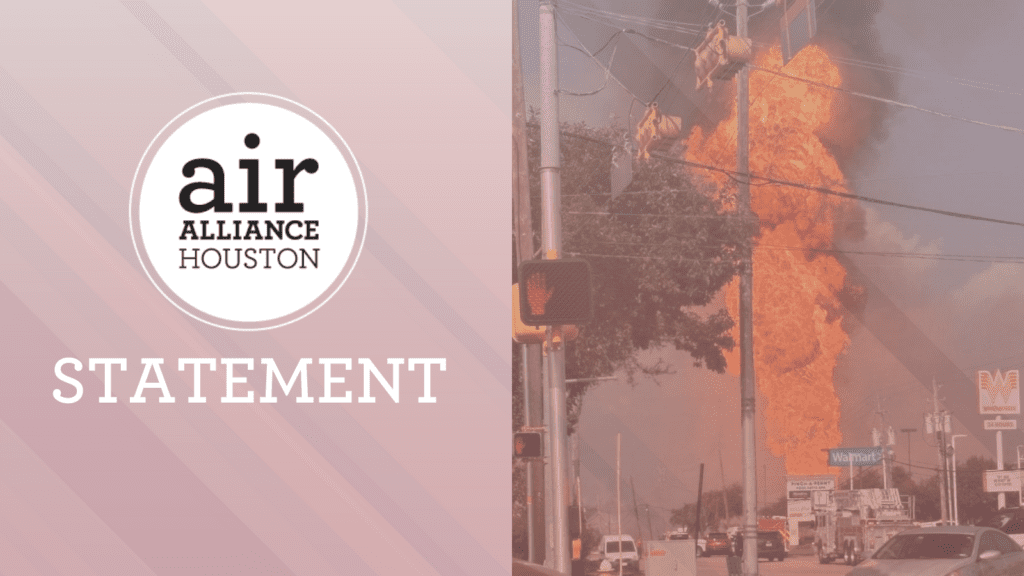DEER PARK, TX – On Monday, September 16, a breach of a pipeline owned by Energy Transfer carrying liquefied natural gas resulted in a high-intensity fire, which has now been burning for over 48 hours.
When there is a chemical leak, there are concerns for air quality. First, the chemicals being leaked must themselves be monitored for health impacts; in this case, the liquid natural gas mixture in the Energy Transfer pipeline. Second, if the chemicals are combustible and fire results, then the smoke, or soot pollution, otherwise known as Particulate Matter (PM2.5), must also be monitored.
It is our understanding from local pollution control services that the intense heat of the pipeline fire has likely combusted the liquid natural gas mixture leaking from the pipeline into soot pollution. Given this (and until additional information is known), PM2.5 exposure remains of greatest concern. PM2.5 is one of the most harmful air pollutants because of its impact on major bodily functions, including the respiratory and cardiovascular systems.
Emergency air monitoring by both state and county officials has been occurring at “ground zero” of the fire since shortly after it began. As of the date of this statement, no comprehensive analysis of the emergency air monitoring results has been released to the public. Harris County Judge Lina Hidalgo has been sharing some results as they become available. Her latest update showed no isolated PM2.5 readings of grave concern.
Stationary regulatory air monitors located across the region have collectively shown elevations in both PM2.5 and ozone every day this week. Unhealthy ozone levels are likely due to current warm weather conditions and existing background pollution levels. Unfortunately, the stationary regulatory air monitor located in Deer Park does not monitor PM2.5. At this time, the emergency on-the-ground air monitoring is the best source for hyper-local data on the ongoing air quality impacts from this incident.
The public can access and monitor daily readings from the stationary regulatory air monitoring system in Houston at www.airnow.gov.
A comprehensive understanding of the air quality impacts of this fire remains unknown. In the absence of such data, it is our recommendation to err on the side of caution and of protecting public health. To that end:
- If community members living or working in the vicinity of the fire do not feel well, they should seek medical attention immediately, especially if they have a chronic health condition or are in a group that is highly sensitive to the effects of air pollution (i.e., infants and children, pregnant people, and people over 65).
- Limit outdoor activity as much as possible while in the fire’s vicinity. For community members who must be outdoors in the area, take Personal Protective Precautions, such as wearing an N95 facemask.
- Those who do not need to be in the vicinity of the fire should continue to avoid the area for personal protection and to clear the area for emergency response.
- While indoors in the vicinity of the fire, take steps to minimize the air pollution coming indoors. Keep doors and windows tightly sealed and set HVAC systems to not draw in outside air.Everyone should continue to monitor the Houston AQI and take recommended precautions, especially while the area remains under an Ozone Alert.
For more information about what to do during a chemical emergency, please read our brochure on Chemical Emergencies: What to do and how to protect yourself.
A final note: following the chemical disaster at ITC Deer Park in 2019, authorities assured the public there were no lingering air quality impacts after the event was contained. Unfortunately, investigative journalism later revealed that air toxics did linger for several weeks following the ITC fire. It is critical that history not repeat itself here. This demands complete transparency from regulators and from Energy Transfer as well as ongoing on-the-ground air monitoring of the fire vicinity for any lingering effects.
If you live in Deer Park and are interested in hosting a community air monitor with Air Alliance Houston, please contact: Diamond Pham at diamond@airalliancehouston.org
###
Media contact: Riikka Pohjankoski, riikka@airalliancehouston.org or 713 589 7079
About Air Alliance Houston
Air Alliance Houston believes everyone deserves to breathe clean air. We support communities as they advocate for clean air and their health. For decades, we have championed clean air through research, education and advocacy. www.airalliancehouston.org

